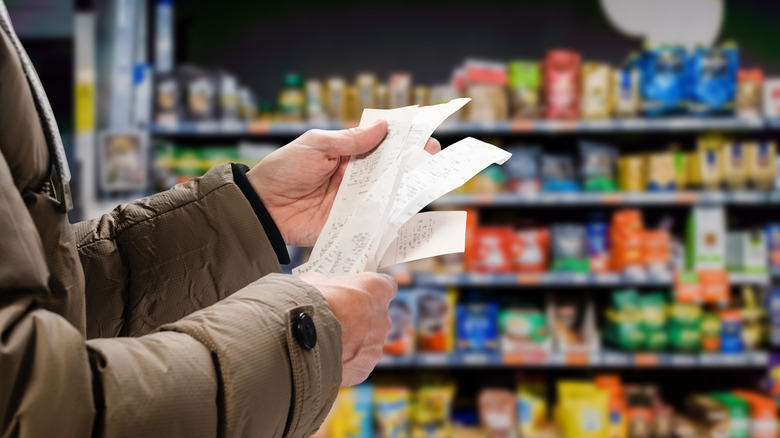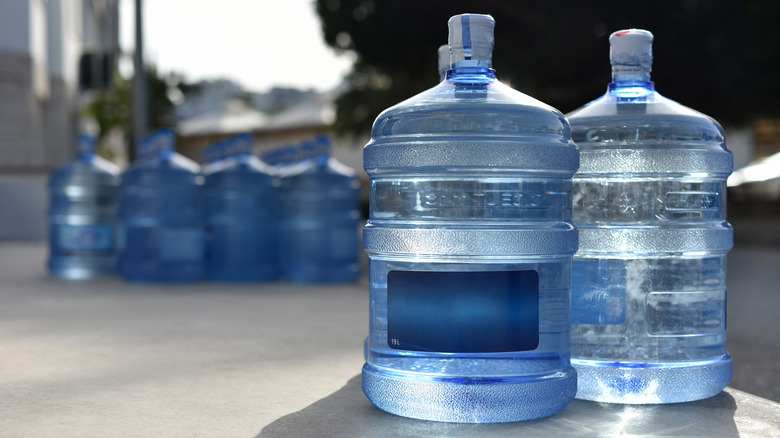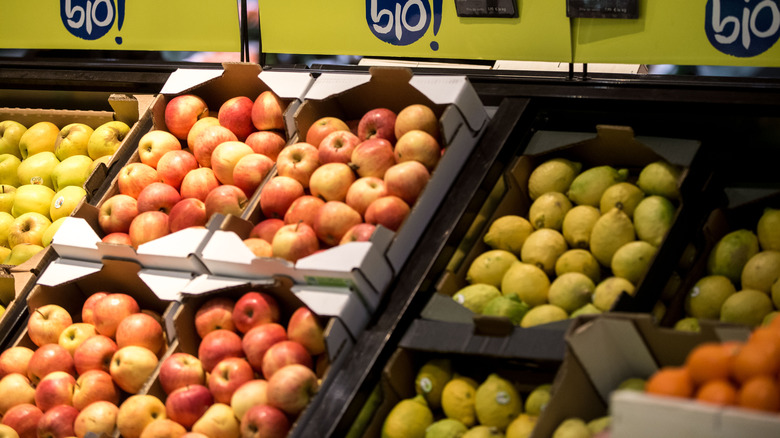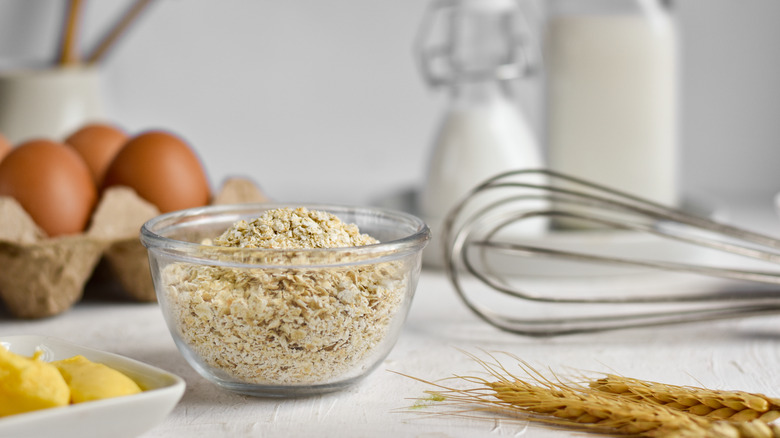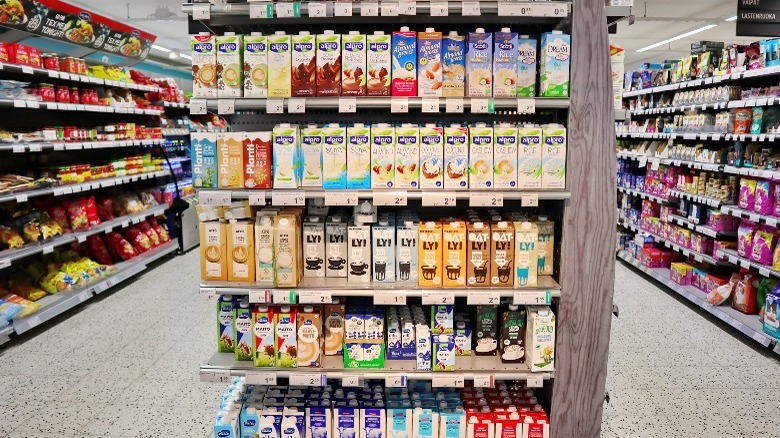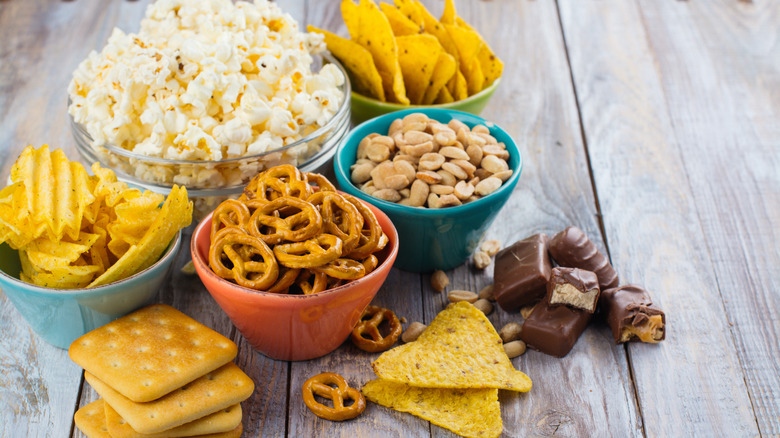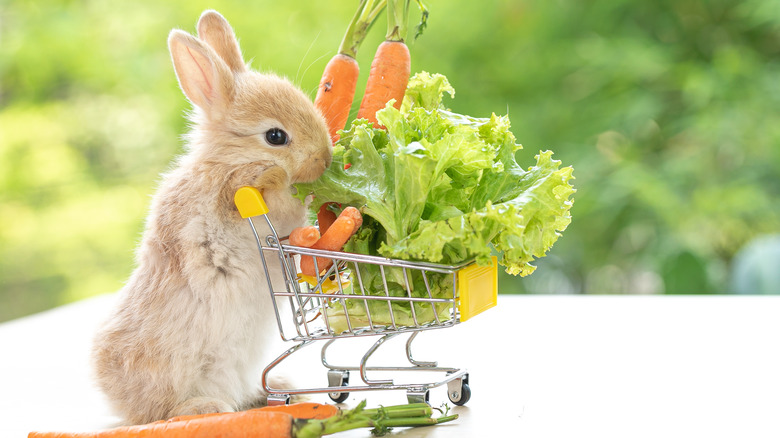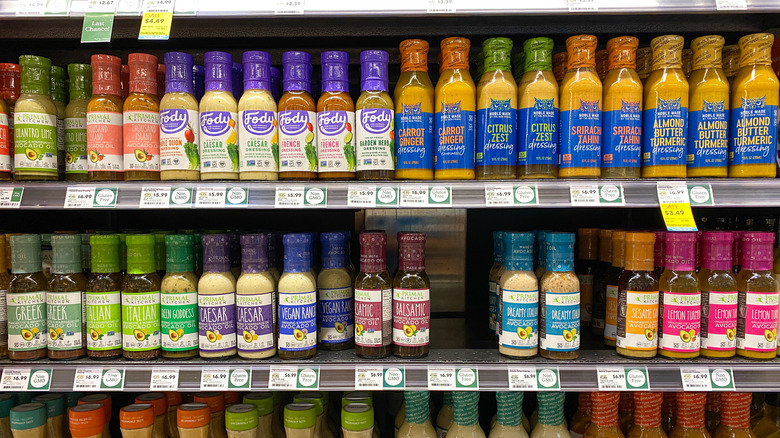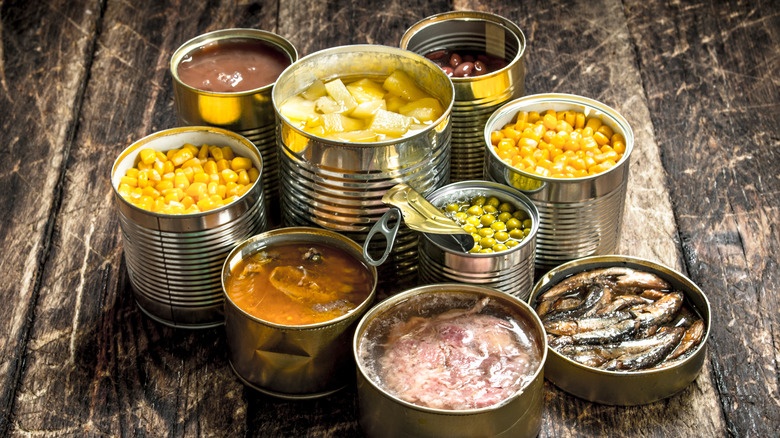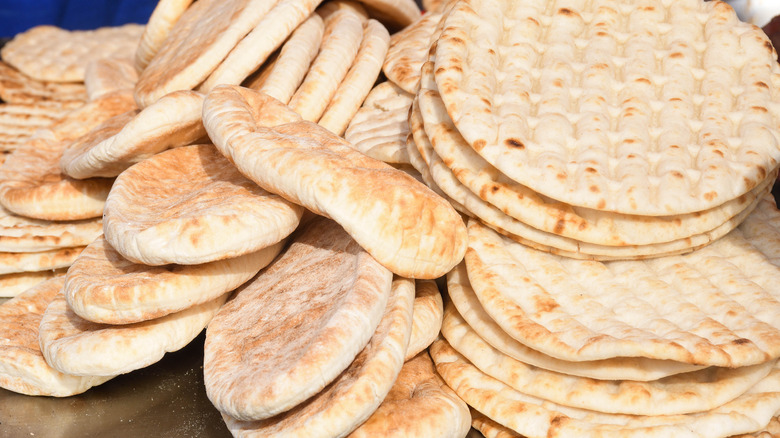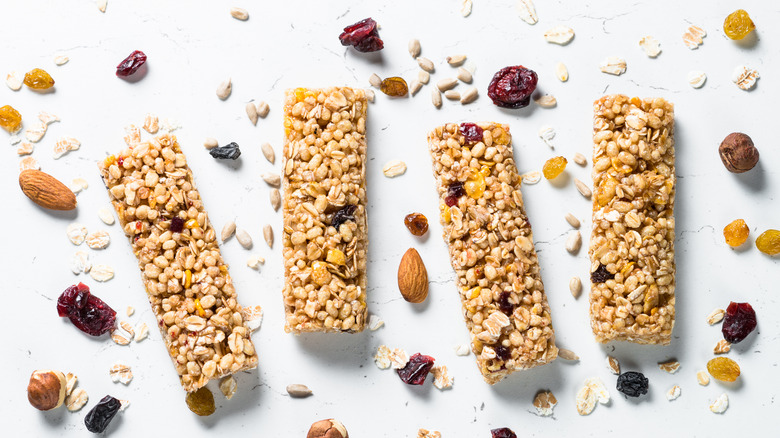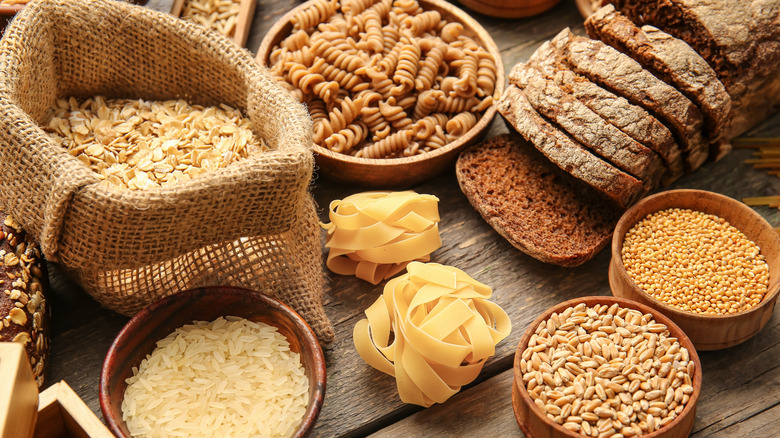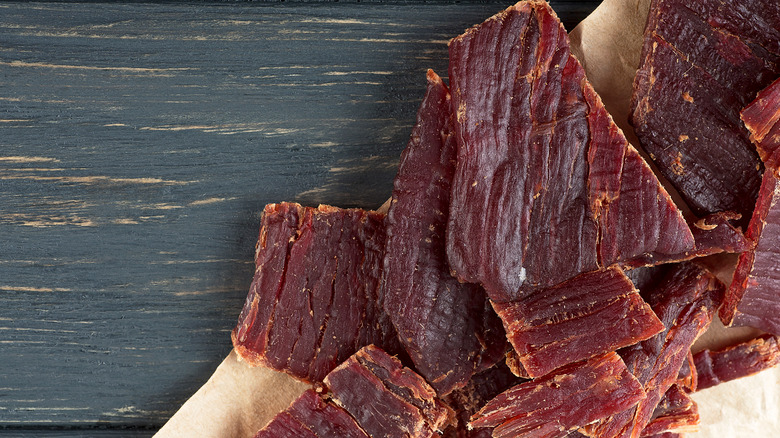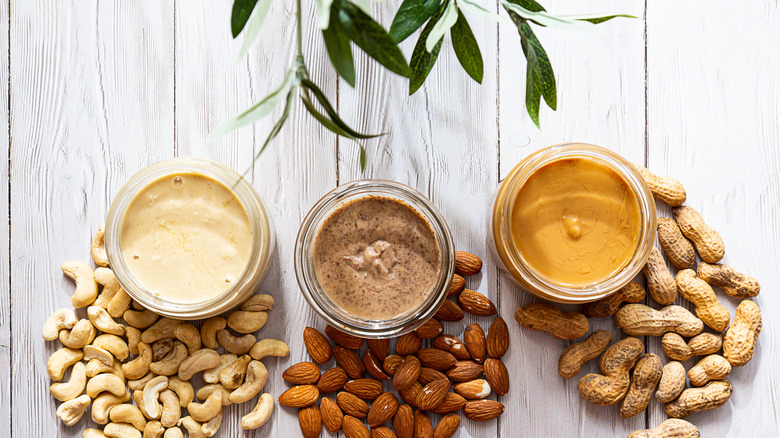Foods You Should Buy When You're Hurricane Prepping
While food is undoubtedly our favorite subject here at Mashed, it's also inherently complicated. Natural disasters such as hurricanes are an often unfortunate reminder, as the logistics of finding your next meal while sheltering from a storm can be range from frustrating to downright impossible. No one wants to have to think about how they would feed their family if they found themselves in a hurricane, but it's the sad reality. According to the National Hurricane Center, hurricane season typically runs from mid-August to mid-October, and it's important to have a plan in place if you happen to live in a danger zone so that you can be prepared, not panicked.
The tricky part of hurricanes is their unpredictability. Depending on the size, a storm can bring about property damage, loss of electricity, flooding, and more. It means that not only is finding food difficult, but simple acts of cooking it can be hard as well. It makes navigating the grocery store a whole different ballgame than your average weekly shopping trip.
The last thing you want to panic about when preparing for a hurricane is food. Thankfully, we decided to make a pseudo shopping list to give you some ideas of some must-haves to stock up on during a storm. These items will come in handy whether you lose power or not, and maybe having some solid nutrition on hand will make dealing with disaster a little more bearable.
Several gallons of water
Water technically isn't a food, but it's probably the most important thing we put in our bodies and, in a hurricane, drinking water can be hard to come by. It's not only essential for drinking, but you will need clean water to brush your teeth, clean with, and cook your food with in the case there's no running water available. The U.S. Federal Emergency Management Agency (FEMA) suggests that in the case of a disaster, a household has at least one gallon of water per day for every person in the house. You should take into account that you might be stuck inside for a bit, so make sure to have enough gallons for several days.
It's never a bad thing to have too much water on hand. It's not like the water will expire, so it's better to be safe than sorry in case of an emergency by having plenty in your home. We recognize the irony of needing to stock up on water when it's down-pouring from the sky, but it's really that important.
Apples and oranges
In the instance that the storm knocks out your power and renders your refrigerator useless, it's not a good idea to stock it full of perishable fruits and vegetables that will spoil in a matter of days. That doesn't mean you can't enjoy a bit of fresh produce, but the key is to be strategic about it. Many long-lasting vegetables like cabbage and potatoes generally need to be cooked before you eat them, which could be a problem if you lost power. However, fruits like apples and oranges are solid options that you can buy in bulk, store in the pantry, and that will stay fresh for up to three to four weeks.
These simple fruits are not just healthy snacks, but can be multipurpose ingredients to totally spice up boring meals like oatmeal, cereal, and granola, especially if you're stuck eating them for days on end. Whole pomegranates and limes are also long-lasting fruits to keep on-hand, even though they're not as simple and versatile as apples and oranges can be.
Instant oatmeal
Instant oats may not be as glamorous a breakfast as bacon and eggs, but they're healthy and will keep you full for a long time. Plus, they can be prepared in a variety of simple ways that require little to no energy in the case of a storm. Sure, you can make regular old oatmeal with hot water if you have access to a heat source. When the power is out, you can soak the oats in shelf-stable non-dairy milk or water and add water pantry ingredients you have on hand to create overnight oats.
Easy mix-ins include honey, brown sugar, cinnamon, bananas, apples, nut butters, and nuts. The oats will soak up the flavor of the mix-ins after a few hours for a tasty and flavorful breakfast that resembles yogurt or pudding. The secret ingredient to well-balanced oats is adding a pinch of salt, which is an easy way to make sure that this simple meal is executed as well as possible. Who knows, you may be able to master the art of oatmeal inadvertently while just trying to feed yourself while sheltering in place.
Non-dairy milk
As previously mentioned, the explosion of non-dairy milk alternatives also is beneficial in times of disaster. Many non-dairy milk options don't require refrigeration, but it's important to buy the boxed versions that aren't sold in the refrigerator section. Almond, soy, and oat milk are common alternatives that are sold in shelf-stable versions. At some stores you may be able to find other niche options like cashew, pistachio, or pea milk.
Milk may not seem like a major necessity to some people, but you'll be glad to have an option on hand if you're eating a lot of oatmeal, cereal, and bland-tasting instant coffee while hunkering down from a hurricane. There are also shelf-stable milk options sold in cans and in powder form as well that can make a big difference when you're working with simple ingredients, but some might require you to add water, so make sure to read the packaging. The last thing you want to do is waste your precious stock for simple mistakes.
Your favorite snacks
When you're preparing your family and your home for a natural disaster, you tend to be hyper-focused on the basics. Sure, as we've been saying, it's super important to have enough water and non-perishable food to make it through, but stress management is essential too. When you're running around the grocery store, checking items off your list, be sure to grab those indulgent items you enjoy. They don't have to be super healthy or practical, but a bag of chips or candy may be a bright spot in your day while sheltering from the storm.
It can be a literal treat between meals of canned soup and peanut butter sandwiches that can have a small but mighty impact on your mood. This is the time that you shouldn't hesitate to grab that chocolate bar in the checkout line because you'll undoubtedly be glad you have it for later. Your loved ones will also appreciate the small act of you picking up their favorite snack in the midst of chaos.
Pet food
The last dilemma you want to find yourself in during a natural disaster is realizing that you forgot to buy enough food to feed the furry friends in your life. It's a simple mistake — the stress of making sure your family has enough of the necessities can easily make you overlook something as simple as pet food, especially since it's usually sold in a separate aisle of the grocery market.
FEMA recommends always having pet food and other supplies for your furry family members, including medicine, on hand in case of an emergency. Your pets will also eat (or technically, drink) into your water supply, so it's important to make sure you have a little extra on hand for them to drink while hunkering down from a storm. Luckily, pet food and treats can usually be bought in bulk sizes so it's easy to stock up on a bigger bag than usual while prepping for a hurricane to hit.
Shelf-stable sauces
It's easy to forget how many tasty additives we store in our fridge on a regular basis until we're stuck throwing out all of our condiments and sauces during a power outage. Those extra flavorful additions may not seem like necessities since they aren't anything close to a full meal, but added sauce and seasoning can make a big difference when you're stuck eating the same thing over and over. Many sauces and condiments need to be refrigerated after opening, making it difficult during a storm when the electricity is spotty.
A few solid options are small jars of tomato sauce, hot sauce, and honey to add something different to plain non-perishable items. Also, a simple jar of seasoning such as Trader Joe's famous Everything But The Bagel can be a godsend when all of your food is really starting to taste bland, and you're searching for some sense of normalcy through a little bit of comforting flavor.
Cans of everything
Everyone's first thought when buying food during an emergency is to raid the canned goods aisle. Whether its cans of soup, vegetables, meat, fish, beans, or fruit, canned items are reliable, affordable, and, most importantly, non-perishable. Sure, cans of ready-made soup or pasta can come in handy for something quick. However, you should also be strategic with the canned ingredients you buy to get creative with the meals you can make. Tuna salad is an easy option to eat in salads, sandwiches, and wraps. However, a few cans of black beans, corn, and Rotel can make for a quick and simple burrito in a pinch when you roll it all up in a tortilla.
Cans of fruit can help to flavor oatmeal and cereal, or can provide a healthy snack all on their own. Cans of sardines and vegetables can also make for simple additions to a pasta or rice dish if you have any access to cooking heat. The possibilities are endless, so don't pigeonhole yourself to ready-made canned meals that will get boring after a while. Also, don't forget to buy either pop-top cans or make sure to have a can opener in your emergency kit, or else you'll run into a much bigger problem.
Bread and tortillas
We've suggested a lot of simple meals of wraps, burritos, and sandwiches, but you can't make it without bread. Obviously when buying bread in bulk, it's always a worry that it will go moldy before you have the chance to eat it. That stress is amplified in times of emergency, so it's all about picking the right options. When grabbing wraps and tortillas, don't pick the already-refrigerated options and stick to the shelf stuff. According to Uno Casa, packaged corn tortillas have the longest shelf life with flour coming in second. Obviously, both options can last even longer (up to 8 weeks) if you have access to the refrigerator, but if not, you should still have plenty of time before they go bad.
Bread can be tricky, but storage plays a big factor. Warm temperatures can promote the growth of mold as well as bread that isn't stored in a dry place with little access to air. Sourdough bread is typically the longest-lasting bread and can go 10 days without growing mold if stored in the pantry. Other store-bought breads with preservatives can last for a solid week without molding, but the biggest factor is making sure you store all your bread in a cool, dry place for the longest-lasting results (via Off The Grid News).
Nuts and granola bars
Adding nuts and granola bars to your list of emergency food items seems like a no-brainer, but sometimes, it's the simple stuff we can forget to buy when our minds are running a thousand miles a minute. These high-fiber, high-protein snacks are popular for hikers and campers because they last forever and actually keep you full, unlike empty carbs like chips or pretzels.
Like almost everything on this list, eating the same flavor of granola bar or a combination of nut mix can get very old. When you're buying for a hurricane, maybe try out a variety pack of granola bars or a new flavor of trail mix with a lot of mix-ins so it doesn't get boring. Also, make sure you have the flavors that everyone in your household likes, so you aren't fighting over the few chocolate chip flavors in the box while also trying to weather a frightening storm.
Instant coffee
It may sound silly, but the last thing you want to be dealing with during a hurricane is an unnecessary headache that prevents you from thinking straight. According to the National Library of Medicine, withdrawal from caffeine can lead to symptoms like pounding headaches, difficulty concentrating, and brain fog.
So if you're used to drinking at least one cup of coffee every morning, it's a ritual you should continue to practice during a hurricane for your own personal sanity. Electricity issues can make grinding beans and firing up the coffee pot difficult, so instant coffee is your friend. Sure, it's not the best-tasting or freshest cup of Joe by a long shot. However, it can be the difference between you dealing with a pounding headache while worrying about protecting yourself and your loved ones and not — which we think is pretty important. As previously mentioned, don't forget items like shelf-stable milk, honey, and sugar to help amp up the flavor of the instant stuff you might not be used to drinking.
Quick-cooking starches
If you are lucky enough to have access to electric power or a generator during a storm, it can still result in spotty electricity that can make cooking difficult. You may end up only having a few minutes to whip up a meal for your family, and it's all about whipping up items that take little to no time to cook.
Obviously, boiling thick rigatoni noodles or making labor-intensive rice dishes when the power is spotty isn't the smartest move. Instead, opt to have a few quick-cooking starches on hand to mix in with those other canned ingredients for a simple and complete meal that you'll be shocked you were able to pull together when resources are so limited. A few solid options are thin noodles like angel hair pasta or vermicelli noodles or minute-cooking rice. Then, you can make pasta with jarred marinara sauce or rice bowls with canned salmon and pickles with ease, and your stomach will thank you.
Beef jerky
Some people are just meat eaters at their core, which can be really difficult if you're trying to make meals with limited resources and refrigeration during a hurricane. It's not like you can stock your freezer with raw meat in the instance your house floods or your power goes out for days on end. When the carnivore cravings are unbearable, beef jerky is your friend. It's non-perishable, loaded with protein, and a super convenient way to get that meat fix.
Different brands make jerky out of other meats besides beef — pork, chicken, turkey, etc. Healthline also notes that beef jerky is full of vitamins and minerals like zinc, iron, B-12, and more that help keep your energy up without requiring any cooking. Jerky can be a sodium-rich snack, so it is important to monitor your intake so you don't chug your supply of water in an attempt to quench your thirst.
Nut butters
Nut butter spreads may be one of those health foods that's always on trend, but it's for a good reason. Filling and flavorful jars of almond butter or peanut butter are packed with protein and other vitamins and minerals that keep you full and energized, without any cooking or refrigeration needed.
Nut butters are a must-have in times of disaster because they're simple and comforting. Oatmeal with almond butter, peanut butter and jelly sandwiches, or even a spoonful of Nutella straight out of the jar are no-brainer ways to feed yourself when eating is the last thing on your mind. You can feel full and ready to handle whatever is coming your way without even having to put much thought into the meal. Also, a little nut butter can go a long way, so it's also an economical item to stock up on as part of your emergency food rations.
